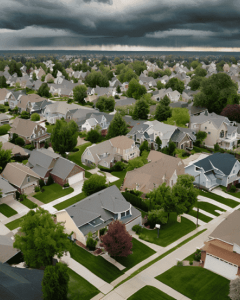Switzerland Real Estate Market: Buying vs Renting
In 2025, buying a home in Switzerland could be more cost-effective than renting. Explore the potential savings and benefits of homeownership in the Swiss real estate market.
A recent report from UBS has indicated that the cost of buying a home in Switzerland may soon become more affordable than renting in the long run. The bank's analysis suggests that as rental prices remain high and interest rates are expected to decrease, the average expense of a Swiss mortgage is projected to decrease, making property ownership a financially advantageous option.
As of March 2024, the average annual cost of owning a 4.5-room apartment in Switzerland, including the down payment, fees, and mortgage, was reported to be 32,500 francs, which is 7 percent higher than the annual cost of renting a similar property. However, UBS has observed a trend of decreasing homeownership costs compared to rental expenses, with owning a home being 16 percent more expensive than renting in the summer of 2023. Individuals who secured a long-term mortgage in mid-2023 are anticipated to have annual costs of 50,000 francs by 2033.
Currently, owning a home is already more cost-effective than renting in Canton Vaud, Fribourg, and Valais. With the Swiss National Bank expected to lower interest rates twice by early 2025 and the housing shortage in Switzerland persisting, UBS predicts that owning a home will soon be more economical than renting over the long term. By the end of 2024, homeownership is projected to be 4 percent pricier than renting, but this trend is expected to reverse in early 2025. In certain regions such as Bern, Solothurn, Aargau, Schaffhausen, and Thurgau, purchasing property is forecasted to be particularly advantageous by the following year.
Despite the potential cost savings of owning a home in Switzerland, the initial financial hurdles associated with buying a house, such as the down payment and fees, remain prohibitive for many individuals. Switzerland currently has the lowest rate of homeownership in Europe, with a report from Wüest Partner in November 2023 revealing that homes are on average 9 percent too expensive for families to afford. In Zug, house prices were found to be 49 percent beyond the means of two working individuals with a mortgage, and this figure rose to 63 percent for single-family homes. Only seven Swiss cantons were identified as offering apartments within the financial reach of an average local family, with this number dropping to just two for single-family homes.
While the cost of buying a home in Switzerland is projected to become more affordable than renting in the long term, the initial financial barriers to homeownership remain a challenge for many individuals in the country.
Switzerland Real Estate Market: Buying vs Renting
Greece Real Estate Market: Rise of Serviced Apartments
Explore the growing demand for serviced apartments in central Athens, where integrated hospitality services attract savvy investors in the Greece real estate market.
Explore the growing demand for serviced apartments in central Athens, where integrated hospitality services attract savvy investors in the Greece real estate market.
Read moreHome Prices Hit by Climate Change, J.P. Morgan Warns
J.P. Morgan analysts reveal a negative link between climate risk and home price appreciation. Explore the emerging trends and their impact.
J.P. Morgan analysts reveal a negative link between climate risk and home price appreciation. Explore the emerging trends and their impact.
Read moreRenting in Spain: Prices Finally Decline
The cost of renting in Spain trends downwards, averaging €13/m². Discover insights on this shift after years of steep increases.
The cost of renting in Spain trends downwards, averaging €13/m². Discover insights on this shift after years of steep increases.
Read moreRise of Cash Purchases Outside London: A New Trend
Explore the growing trend of cash purchases outside London and its implications for the property market and economic landscape.
Explore the growing trend of cash purchases outside London and its implications for the property market and economic landscape.
Read moreCanada Real Estate Market: Rents Drop for First Time in over 3 years
For the first time in over three years, average asking rents in Canada fell 1.2% in October, reaching $2,152, according to Rentals.ca.
For the first time in over three years, average asking rents in Canada fell 1.2% in October, reaching $2,152, according to Rentals.ca.
Read moreFewer Than 2% of Dutch Homes Sold to International Buyers
Analyze the decline in international purchases of Dutch houses, revealing key factors influencing this trend and its effects on the housing market.
Analyze the decline in international purchases of Dutch houses, revealing key factors influencing this trend and its effects on the housing market.
Read moreDonald Trump’s Victory May Boost London Property Demand
Knight Frank analyzes how Donald Trump’s election win could increase demand for prime London properties. Discover the potential market shifts.
Knight Frank analyzes how Donald Trump’s election win could increase demand for prime London properties. Discover the potential market shifts.
Read moreGerman Investors Fuel Growth in Greek Real Estate Market
Discover how German-speaking house buyers are revitalizing Greece's realty market, driving demand and investment in stunning properties.
Discover how German-speaking house buyers are revitalizing Greece\'s realty market, driving demand and investment in stunning properties.
Read moreLisbon: 11th City for Rising Luxury House Prices
Lisbon's luxury housing prices increased by 5.6%, outpacing Madrid, Seoul, and Zurich, marking it as a key player in the global real estate market.
Lisbon\'s luxury housing prices increased by 5.6%, outpacing Madrid, Seoul, and Zurich, marking it as a key player in the global real estate market.
Read more














